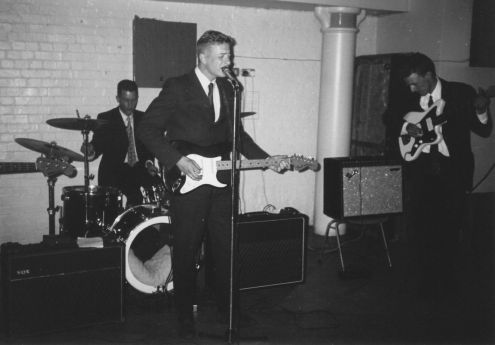Timeless resolve
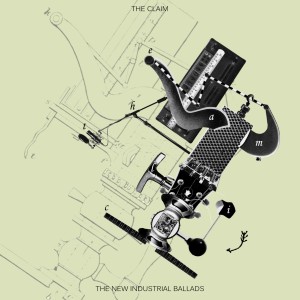 The Claim – The New Industrial Ballads
The Claim – The New Industrial Ballads
Generally, I’m not a fan of comebacks. Sure, there are exceptions – Johnny Cash, the Go-Betweens, the Wild Swans, off the top of my head – but for every unexpectedly great later work, there are many which make you wish an artist or a group had let their oeuvre be. It tends to be the case that if you stop exercising that song-creating muscle, it’s hard to get it back into the shape it was in when you were working out regularly.
Increasingly though, people do pick up their instruments again, once nostalgia for the old days overcomes the sour memories of the internecine tensions of being in a band; or the thankless grind of forever trying to draw attention to the music is forgotten; or, more practically, because the kids have become independent beings, and time has opened up again.
The Claim – Davids Arnold and Read, Martin Bishop and Stuart Ellis – are in that exceptional bracket. 31 years after their last LP, and ten after the Black Path retrospective, here is (or are) The New Industrial Ballads. (It’s a not untypical title for the Claim, somewhat defiant, a little bit odd. But meaningful, since each of those words – ‘new’, ‘industrial’, and ‘ballad’ – could stand for something else. Art and work and love: three important ingredients in good and fruitful lives.) There’s been no apparent diminishment of their musical nous or chops, while David Read has obviously looked after his vocal chords, because they can still express what they used to be able to as effortlessly as ever.
After an instrumental prelude, the driving beat of Journey kicks in. Its musical rise and fall suggests that it’s the group’s intention to take the listener on a journey, too, through time and space and mood. It’s followed by Smoke & Screens, which starts off as an acoustic paean before electric guitars and strings stir up an emotional storm that’s comprised partly of remorse, and partly weariness. In these two songs you have the album’s lyrical concerns in a nutshell – proudly (but never overbearingly) political on the one hand, and on the other, charting the ups and downs of emotional fortune that tend to accumulate once there is more of life behind than ahead of you.
Like London buses, a third deeply affecting melody arrives alongside the kerb and takes you to The Haunted Pub, where David Read looks back down the years and simultaneously mourns and celebrates the memories such pubs evoke. Light Bending also has the pep and melodious zip of, say, God, Cliffe and Me or Waiting For Jesus from back in the day. Vocally, David Read sounds at turns sure-footed, reflective, vulnerable, as young as he was when the Claim were first making their way in the world, and yet never less than gracefully mature. Musically, the album is rich and beautifully recorded, with a just-so balance between detail and space; the group have clearly taken their time to get everything absolutely right. Is it a better album than Boomy Tella? In its greater variety and lived wisdom, definitely. If it wasn’t foolish to wish that things had turned out differently, I might say it’s a shame or even a crime that the intervening years haven’t given us another half dozen Claim albums of likely the same quality; another sixty odd melodies sung in that wonderful, lilting voice.
If these are The New Industrial Ballads, what were the old? That depends upon which side of the Atlantic you are. Over in America, they were the songs of struggle which emerged from the coal mines, textile mills and farms of the 19th century, kept alive in the 20th by the likes of Pete Seeger. On this side of the pond, we’re talking about the broadside ballads that came out of the Industrial Revolution – broadside as opposed to broadsheet, because the songs were printed solely on one side of paper and sold cheaply. The specific inspiration is Jennifer Reid‘s recent efforts to air the broadside balladry of Manchester and Lancashire, and it’s led to the Claim’s own adaption of an industrial ballad in the form of When the Morning Comes, sections of which recall the spoken word French on the Jam’s Scrape Away, and also remind me of Ultramarine’s Kingdom (featuring Robert Wyatt on vocals). In a similar act of historical reclamation, its lyrics were adapted from The Song of the Lower Classes by Ernest Jones, which Ultramarine discovered in the folk song archives of the Vaughan Williams Memorial Library at Cecil Sharp House.
At least one of this new set of songs is an old industrial ballad of the Claim’s own devising: Hercules dates from demos recorded around 1991-92. Brought back to life after all these years, it’s the equal of Aaron Neville’s song of the same name (written by Allan Toussaint), which may or may not have suggested the title and the not dissimilar subject matter:
‘Looking from my window sill
From a tower block I see
Boarded-up shops, run-down housing
There’s your Big Society’
An absolute highlight of the album comes when the pacy Just Too Far abruptly judders to a halt and immediately segues into the down-tempo, mournful Mrs Jones. It’s hard not to see the latter as a companion piece to Boomy Tella’s Mrs Shepherd, and it’s a dose of the kind of Thames delta blues I never thought I’d have the pleasure of hearing again.
On 30 Years, old fellow traveller Vic Templar (aka Ian Greensmith) returns to narrate another story that makes the passing of time explicit. While lyrically the album as a whole does feel like a journey into the past, musically it all sounds too fresh to be regarded merely as a period piece. Eventually the journey arrives back at the beginning, and Estuary Blues and Greens – the scenery that was the backdrop to the Claim’s formative years, and is now an anchor in the present: ‘this place helps me find my feet’. You could add Estuary Blues and Greens to the Action’s legendary Rolled Gold recordings without there being any drop-off in quality or loss of that collection’s visionary, psychedelic mood – it’s that good. As is the song with which the Claim close the album, Under Canvas. It’s a personal ballad in the style of early John Martyn or Bert Jansch, and as touching as anything on Paul Weller’s most recent studio album, the wonderfully folky True Meanings. I’d love to hear more in this style, but then I’d be happy to hear more of the Claim’s music in any style they choose. Here’s hoping we won’t have to wait another three decades for it.
- The New Industrial Ballads by The Claim (A Turntable Friend)
Beneath the branches, and the reach
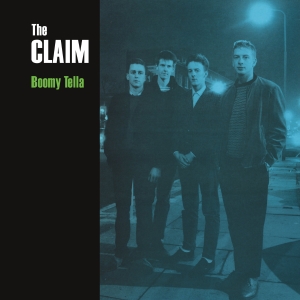 Can it really be more than thirty years ago that The Claim’s Boomy Tella LP was released? Decades have flown by, but a record I’ve consistently listened to for (considerably) more than half my life now seems to exist outside of time passing. This is the beauty of a favourite recording – its magical moments are frozen, not in aspic or ice but in some living, breathing sense, whether the overriding feeling is upbeat or downhearted. The distinctive first few beats and bars of Not So Simple Sharon Said sound out, and those intervening decades drop away. I could be nineteen again, and tapping my foot to them at The Falcon in Camden, or smiling as John Peel plays the song for the first time on the radio. Every note remains familiar to me. It’s hard to step back and attempt to appraise it afresh, let alone objectively.
Can it really be more than thirty years ago that The Claim’s Boomy Tella LP was released? Decades have flown by, but a record I’ve consistently listened to for (considerably) more than half my life now seems to exist outside of time passing. This is the beauty of a favourite recording – its magical moments are frozen, not in aspic or ice but in some living, breathing sense, whether the overriding feeling is upbeat or downhearted. The distinctive first few beats and bars of Not So Simple Sharon Said sound out, and those intervening decades drop away. I could be nineteen again, and tapping my foot to them at The Falcon in Camden, or smiling as John Peel plays the song for the first time on the radio. Every note remains familiar to me. It’s hard to step back and attempt to appraise it afresh, let alone objectively.
But this is what the reissue of Boomy Tella on A Turntable Friend Records is suggesting I should do. What David Arnold’s touchingly humble sleeve notes (‘This was nearly our great album’) tell me were ‘cheap rattling drums’ and ‘replica guitars’, still sound as thrillingly rich to these ears as they did when I first heard the LP in late 1987. And the remastering has put a little more boom into Boomy Tella, with Stuart’s sure-footed bass playing in particular coming through more clearly than I ever recall it doing on my old vinyl.
The songs are simple, yet surprisingly sophisticated. The singing is heartfelt, yet lyrically speaks so often of doubt. Uniquely, the music mixes the bloodlines of mod pop and English folk song, but much less consciously than that might suggest; while the Claim would have been entirely au fait with the Jam and the Style Council, I don’t imagine David Read had heard much if any folk music before recording Boomy Tella, and yet if you heard it a cappella, his unaffected singing voice might easily lead you to place him within the tradition of English folk song.
No matter what calibre of instruments the two Davids, Stuart and Martin were using, it’s all beautifully played, something fans came to expect of the Claim, having seen so often with our own eyes what a high-functioning, single-minded quartet they were. Here’s how Kevin Pearce, who originally put out the LP on his Esurient label, described it not long after its release, in a piece for my fanzine of the time:
I love the way it’s finely balanced. The way it’s sinewy and substantial but understated and light on its feet. The way there’s something to get your teeth into but something you can’t quite put your finger on. The way it’s so English like Ray Davies, Vic Godard but altogether strange somehow. The way I keep coming back to it like a tongue always comes back to a loose tooth. Most of all I love the way Not So Simple Sharon Says starts as much as I love the way Waterloo Sunset starts.
Boomy Tella’s cover may have been deliberately artless, but that continues to conceal an artful, inventive approach to songwriting. Guitars are picked, strummed, and struck into modernist shades of red and blue, while bass and drums form a rhythmic backbone that is indeed foot-tapping in its simplicity. Over the top David Read weaves a lyrical sense of the absurdity of the everyday into those folkish melodies of his. On one level the group are mates having a laugh, incidentally producing consummate moments of pop music like Beneath the Reach. On another, they’re gifted poets telling it like it is, playing it how they feel it, and coming up with something of the emotional heft of Down By the Chimney.
The Claim achieved a marriage of unforced exuberance and subtlety that set them apart from the majority of both the independent music of the era and the Britpop that was to follow. Where might the Claim be now if they had had the time, space and money to plot a course through the ’90s and beyond? As with so much artistic endeavour, the what-ifs are legion.
Live, the Claim were both engaging and inspiring – and having seen them play again last weekend at the 100 Club, I can report that they still are. For me, no other group of the time and type combined serious musical intent and a sense of ease and enjoyment better than the Claim did at their best. Davids Read and Arnold would introduce what were obviously carefully composed and cherished songs with carefree good humour. Odd rhythms and jazz inflections, indeed odd touches all round, informed what would otherwise have been straight-ahead pop. Dave Arnold held his guitar high against his chest, and the unconventional playing style contributed to the choppiness of the sound. Thanks to the expressive range of Dave Read’s wonderful, lilting voice, the Claim could be both irrepressibly upbeat and as blue as Miles, though cheerfulness would keep on breaking through.
The Claim tried not to let their lack of acclaim get the better of them. They kept on keeping on, playing shows to a small but devoted following, putting out great singles, but eventually, inevitably, there came a period in the early 90s when it must have felt like the returns were ever-diminishing. And so they called it a day and got on with their lives, until the time was right to regroup and – as they say in football after a defeat – go again.
The freshly remastered Boomy Tella comes with a quartet of extra songs: a Jam-my demo of the later B side, Business Boy; an equally robust rendering of God, Cliffe and Me; a fabulously lively take of live favourite Fallen Hero; and an untitled northern soul stomper that I don’t recall ever hearing. It’s all great, and my appetite is well and truly whetted for the group’s new material, especially having heard a handful of the new songs live. It’s due to appear in album form come May. The title? The New Industrial Ballads. The expectation is that they will be at the very least on a par with the old industrial ballads of Boomy Tella.
45 45s #31 The Claim – Sunday (Esurient, 1991)
 A bedsit in Holloway, circa 1991. Dave Arnold, guitarist from Kentish four piece the Claim, has made the journey into London from his village bordering the Thames estuary to talk to me. He wants to ask me about something; I can’t imagine what. Once he has cuppa in hand, he springs it on me. ‘We’d like you to be our manager, Dan.’
A bedsit in Holloway, circa 1991. Dave Arnold, guitarist from Kentish four piece the Claim, has made the journey into London from his village bordering the Thames estuary to talk to me. He wants to ask me about something; I can’t imagine what. Once he has cuppa in hand, he springs it on me. ‘We’d like you to be our manager, Dan.’
‘Blimey,’ I probably said in reply, and then almost certainly began to um and ah. I’m not sure what’s prompted it, other than my loyal support, writing about the group and turning up to most if not all of their London shows; that and the thankless task of representing themselves, perhaps. They could not have asked a less Svengali-like figure. I was unemployed, depressed, prone to tension headaches, and introverted to the point that even making a phone call to a friend held a degree of challenge for me.
So like a eejit, I turned Dave and the group down. With responsibility for their success in my hands, perhaps I would have pushed myself, and more through dedication than guile, managed to forward their cause a little. Grown with the role. But at that stage of my life, I feared it would be too much for me, and that I would have to resign as soon as it got like that, or find myself sacked when they saw I wasn’t coping. And then there was my own dream – of writing, literary greatness even – which I believed at all costs I ought to be pursuing.
But I always felt honoured to have been asked, and if I had my time again, I like to think I would say yes, and worry about the worries and time for writing later. Say yes to everything, kids, that’s my advice. If it doesn’t work out, it doesn’t work out. Don’t be afraid of failure. And if you are thinking of being a writer, live some life before you sit down to write. That’s as important as finding the time to practice the art of it.
I still love the Claim’s music. It’s simple, yet surprisingly sophisticated. It’s heartfelt, yet lyrically speaks so often of doubt. It mixes the bloodlines of the Jam and English folk song long before Paul Weller thought to himself, and much less consciously than that might suggest. You should all buy a copy of the retrospective compilation, Black path. I can say that without declaring an interest, because not having become their manager, I’m not on a cut or anything.
Initially when it came to picking a 45 of theirs, I was going to go with ‘Birth of a teenager’ – which I could with a degree of right claim as my own because scratched between the run-off grooves of its delightfully funny spoken word B side ‘Mike the bike’ (featuring Vic Templar) is ‘FOR DAN PANTRY’ – but to be honest I much prefer this song, a kitchen sink fantasia and homage to the dubious joys of the day of rest. It shares the same bleak Goffin & King vision as the Monkees’ ‘Pleasant Valley Sunday’, only with an enhanced sense of melancholy which no doubt results from the dismal nature of enduring Sundays in Britain in the 1980s. Lyrically Dave Read ventures beyond the view from the kitchen sink to daydream Walter Mittyishly as to what he’d answer if he were interviewed by the Sunday supplement he is thumbing through, a conceit that’s doubly rich for being handled straight within the context of the song, but also telling in terms of the Claim’s own inability to grow an audience to and beyond the point where he might have expected to be interviewed on a regular basis. Instead, he is the captive big cat featured on Alistair’s cover, caged and prowling, dreaming of the Serengeti.
Melodically it’s perfect, so that if Dave Read had merely hummed his way through the song, you would still experience the same emotion of feeling ensnared within a suburban dream while real life happens elsewhere. It’s also beautifully played by the group, something fans came to expect of the Claim, having seen so often with our own eyes what a high-functioning, single-minded quartet they were.
Having chosen consciously or otherwise to operate somewhat outside of the times, the Claim never did garner the audience they deserved. Perhaps they might have, had they had been as hip to the sounds of now as Damon Albarn’s Blur were, but since the Claim possessed more insouciance than swagger, it wasn’t to be.
New wine
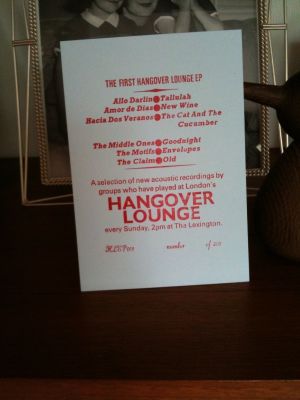 I should really plaster this with declarations of interest, as one among the folk behind the Hangover Lounge concern is a good friend of mine, but the truth is I’d be writing about their first EP regardless, because (a) it contains the first chance to hear Amor de Días, Alasdair MacLean of the Clientele’s new side venture in the company of Lupe Núñez-Fernández, and (b) it contains the first new recording by the Claim for nigh on twenty years. So for me it’s an event as much as a record. I wrote about the groups together once, the Clientele and the Claim, little imagining that their key players would end up in 2010 on either side of a nicely heavy slab of vinyl.
I should really plaster this with declarations of interest, as one among the folk behind the Hangover Lounge concern is a good friend of mine, but the truth is I’d be writing about their first EP regardless, because (a) it contains the first chance to hear Amor de Días, Alasdair MacLean of the Clientele’s new side venture in the company of Lupe Núñez-Fernández, and (b) it contains the first new recording by the Claim for nigh on twenty years. So for me it’s an event as much as a record. I wrote about the groups together once, the Clientele and the Claim, little imagining that their key players would end up in 2010 on either side of a nicely heavy slab of vinyl.
I suspect the Amor de Días album, set for sometime release on Merge, will be something of a grower (there’s a tantalising short medley from it on the Amor website). ‘New wine’ is the first chance to hear how the sound might vary from that of the Clientele, softer and subtler even than the Lupe-featuring ‘No dreams last night’ on God save.., if that’s possible. It’s also notable for hymning a part of London that few if any have hitherto, namely Crystal Palace.
‘Old’ is the rueful, timeless number by the Claim, a reflection on ageing and death and carrying on which they might perhaps have written back in the day (‘Dear’ on the Black path retrospective suggests as much) but seems all the more poignant for the two Daves being – ahem – that much closer themselves to the subject they’re writing about (as of course we all are). It puts me in mind of Colin Moulding’s song ‘Dying’ on Skylarking – ‘what sticks in my mind is the sweet jar on the sideboard, and your multi-coloured tea cosy’ – and of Ray Davies. The Claim for me were always in that league, and they still are. An atypical typical pop group.
Of the other contributors, Hacia Dos Veranos turn in a lovelier instrumental than one called ‘The cat and the cucumber’ has any right to be, while Allo Darlin’s ‘Tallulah’ is pretty too; no prizes for guessing whom they are referencing with the title. Funnily enough you can imagine Robert Forster doing a nicely wry cover version.
Three cheers then to the Hangover Loungers for making it happen, and for what are high quality production values for a first venture as a record label. There are two more EPs to come, and one of them features Rozi Plain, and no doubt many of the other acts who have graced the Sunday afternoon club with their acoustic presence, so readers would be well advised to collect the set.
All about hope
A reminder that the Claim open for the Dentists in a Medway spectacular at Dingwalls in Camden on Thursday 25th March. Here to celebrate this once in blue moon appearance are two songs from their Boomy Tella LP which can consider themselves unlucky not have made it on to last year’s Black path retrospective.
- The Claim – All about hope (fades in slowly)
- The Claim – Beneath the reach
- The Claim MySpace
Absolutely second to none

I completely concur with Vic – the Claim were bloody marvellous on Saturday night in Rochester. Not better than I remember, as I said in the immediate aftermath, but simply as great as I made out in words written about them many years ago. So it’s pleasing to know that my memory isn’t playing tricks on me, that it wasn’t all a dream, and that the Claim were – and are – worth raving about.
Phil Dillon’s photos of the night are infinitely better than mine.
Loser’s corner
28th September 2009. Set your faces to stunned and make a note of the date in your diaries, for that’s the day on which the Claim finally make it onto CD with the release of Black path: retrospective 1985-1992. Who’d have thought that in 2009 they would be releasing a record within eight days of the Clientele, whose Bonfires of the heath is out on 6th October; another astonishing preview track (‘Harvest time’) is available here. (I first hitched the two groups together for this 2001 piece for Tangents.)
To celebrate, here – courtesy of the Right Honorable Vic Templar – is a link to a YouTube outing of one of the previously unreleased songs on the retrospective, the not entirely typical ‘Between heaven and Woolworths’.
And here are the pages from Pantry For The World which celebrated the Claim’s Boomy Tella (‘the best LP of 1988’) and their subsequent singles for Esurient. The quote about the Claim live came from a letter written by one Richey Edwards, whose group had just made their London debut supporting the Claim.
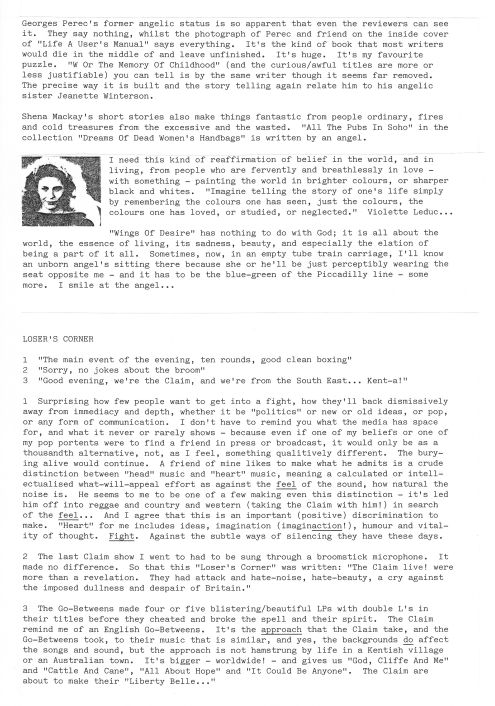
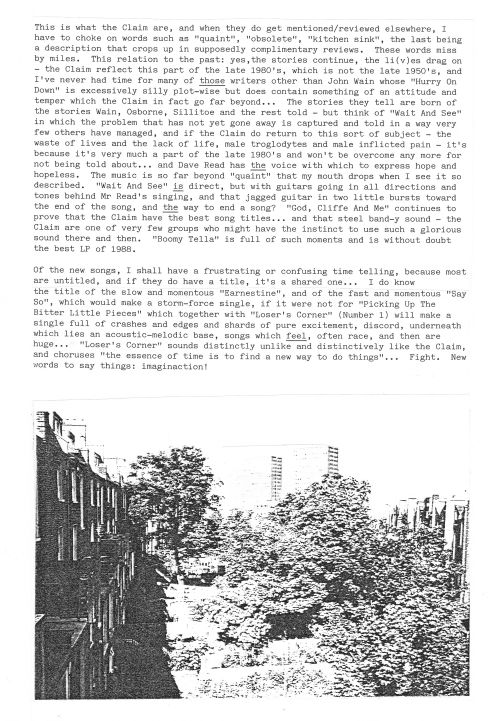
Here also is one half of the Pantry For The World supplement, featuring a piece about the Claim by Kevin Pearce, who wrote about them with the appreciation and bias appropriate to the man who was releasing their records.
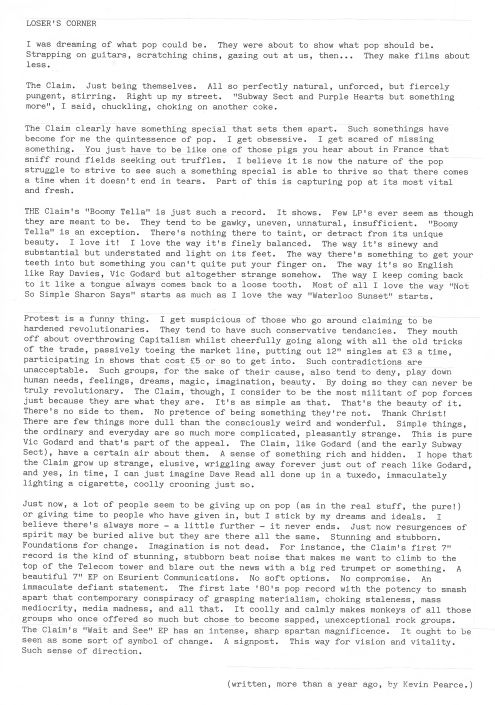
Black path tracklisting:
Picking up the bitter little pieces
Birth Of A Teenager
Plastic Grip
Say So
Mike The Bike (Featuring Vic Templar)
Sunday
Being A Minor
Between Heaven And Woolworths (For Brian Patten)
Gullible’s travels
Not So Simple Sharon Says
Christopher
God, Cliffe And Me
Ernestine
Sporting Life
Dear
Mrs Shepherd
Treasurehunting
Do You Still Feel?
Down By The Chimney
Lonely Tarts
Love Letter
Wait And See
Mary Stavin
Seen And Done It All
Loser’s Corner
That’s one half of Boomy Tella by my reckoning, and sadly means no room for the trombone-fuelled knees-up of ‘Beneath the reach’ or ‘All about hope’, on which the Claim were at their most exquisitely pastoral. Fingers crossed Boomy will before long get a release in its own right. Neither ‘This pencil…’ nor ‘Another yesterday’ feature – they can be downloaded here.
There is also at least one live date confirmed at the Royal Function Rooms in Rochester on Saturday 19th September with the possibility of a London appearance.
- The Claim (MySpace)
This pencil was obviously sharpened by a left-handed Indian knife thrower
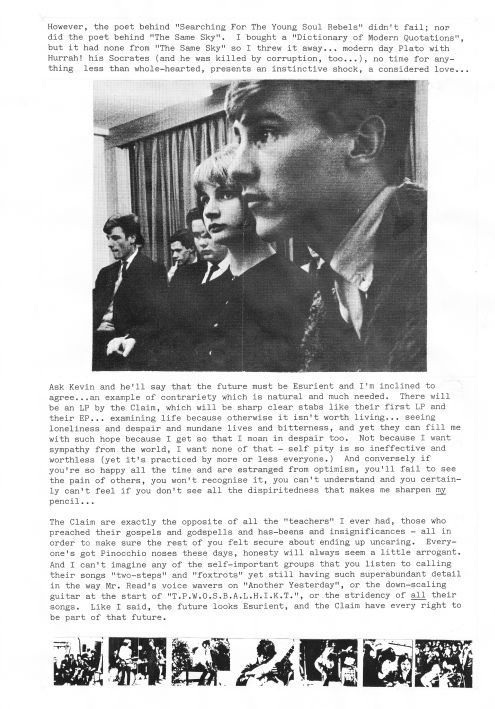
A jumped-up pantry boy has made frequent reference to the Claim over the two years it’s been up and running. Here from Pot Plant Pantry is the piece in which I first wrote about them, spurred on by seeing the group for the first time at the Black Horse in Camden in July 1987 and by acquiring their debut LP Armstrong’s revenge & eleven other short stories, and the EP This pencil was obviously sharpened by a left-handed Indian knife thrower.
I can’t remember from where I dug up the picture of the smartly dressed set of sixties youth, but it’s not too far fetched to say that these were the kinds of faces you would see twenty years later watching David Read, David Arnold, Martin Bishop and Stuart Ellis, who had replaced Adrian Hatcher on bass.
Still no sign of that Bus Stop compilation, I’m afraid, and alarmingly the label’s website seems to have disappeared. However, over at the Claim website, Rich has added a late demo dating from the time that the Claim changed their name to the English Scene. Written after Dave Read had stared thoughtfully down from the balcony of a tower block in Bow, ‘Hercules’ a.k.a. ‘Cathy loves Hercules’ typifies all that was great about the group.
While we wait for the chance to hear more of the earlier songs in full Technicolor glory, here in black and white are the two songs I mention in the piece.
Picking up the bitter little pieces
Well done to Vic who is trying hard to get some wind behind an unlikely Claim revival here and here. Vic was if I’m not mistaken the writer and narrator of ‘Mike the bike’, the B side of the group’s ‘Birth of a teenager’ single for Bob Stanley’s Caff label.
It will be a joyous day indeed when the Bus Stop compilation – originally scheduled for release in 2002! – finally sees the light of day. Meantime there is a Claim website streaming a few of their songs, and efforts have been made on YouTube which allow you the pleasure not just of ‘Sunday’, ‘Sporting life’ and ‘Birth of a teenager’, but also of seeing the Two Daves (Read and Arnold) performing ‘Picking up the bitter little pieces’ as recently as July last year.
Riding on the crest of a new wave
Appearing around the time that the Manic Street Preachers took to the stage to help celebrate Heavenly’s eighteenth birthday last month, here is a great interview by Simon Price with Nicky Wire and James Dean Bradfield. It focusses on their time on the Heavenly label, and includes some reflections on the group’s first London outing, promoted (I use that word in its loosest sense) by ‘mod English eccentric’ Kevin Pearce. Bob Stanley wasn’t the only one laughing that night – the Manics compelled a reaction, and the laughter was instinctive; pleasure that they were as over the top as they were, mixed with an undercurrent of derision (for they seemed ludicrously deluded), and possibly an edge of hysteria at what might happen next.
There are honourable mentions in the interview for the Claim and Bullfrog fanzine (edited by Chris Jones who is discussed elsewhere in these pages), apparently a favourite of James’. The tone of the interview is affectionate and humble, and it’s hard not to smile at the idea of Jeff Barrett and Martin Kelly as an indie version of Brian Clough and Peter Taylor.
Let me see you
Alistair has been posting live recordings of the triumvirate of groups who recorded for Kevin Pearce’s Esurient label, along with the handbills produced to advertise the shows. In the absence of the half-dozen long-players that collectively the trio should have gone on to make, these sets formed part of my staple listening for many years. Subsequently whenever I’ve dug them out of the Pantry vaults, they have had the power to remind me of what I believed then – that on their night each was the best band on the planet. The tapes may now have become a myriad of bits compacted into a file, but they have lost none of their wow and flutter. Though very different from each other, what all three groups had in common was the ambition of their song-writing and the attacking edge with which they performed; the same edge and attack that led to the creation of their record label. You knew in your heart that group and audience were the outermost of outcasts, hanging by a finger from the bottom rung of a ladder each were ambivalent about climbing, but these upstairs rooms above pubs – whether Horse and Groom or King and Queen – were the pitch for some of the most intense musical experiences of my life. So intense that that for sanity’s sake I had to take a break from attending the Esurient shows. Not being there was of course worse than the frustration I felt in the ineluctable sense when I watched them that these groups were never going to be allowed to rise above the level they had attained in finding someone who had enough belief in their greatness to stage their shows and put out their records.
They were joyful nights by and large but at its most intense, and when you are at your most susceptible to its intensity, there is as much pain as pleasure in music. That’s what I still hear when I listen to either of the live versions of Emily’s ‘Stumble’ that Alistair has made available to a world which, I suspect, will be about as interested as it was near on twenty years ago. But you’ll be pleased to hear I’m over it now. Honest.
Ernestine
I should have mentioned in my ‘Goodnight’ post that there is a Claim website. Assuming you have Adobe Flash Player installed, you can listen to a handful of their songs, including Boomy Tella opener ‘Not so simple Sharon said’, their single for Bob Stanley’s Caff label ‘Birth of a teenager’, ‘This pencil was obviously sharpened by a left-handed Indian knife thrower’ (labelled ‘T’ on the player for obvious reasons) and an awesome demo of live favourite ‘Ernestine’ recorded with a string section, the magic of which is getting me – all over again – just a little hot under the collar that it never saw the light of day at the time.
Goodnight
His voice has lost its top-end choir boy sweetness, and the bottom-end is rougher than it was, but you can still see performance magic in this clip of Dave Read singing ‘Goodnight’ from a rendering of the whole of the White album at the end of last year. Bob Collins formerly of the Dentists is playing the guitar.
Dave was the singer in the Claim, the best thing to come out of Kent since hops were first harvested, and this is a second echo since they disbanded fifteen years ago, the first being his vocal on ‘My number nine’, a B side by Coax that I will surely write about in my ‘Backed with’ series before long (and mentioned in this piece on the Claim and the Clientele).
It may look like a bloke who’s put on his best shirt to sing karaoke in a boozer, but to anyone who saw the Claim at their peak in London in the late 80s, it’s so much more than that – a touching reminder of the Claim’s ordinary genius. Of course I would rather have stumbled across a clip of Daves Read and Arnold doing ‘God, Cliffe and me’ from that time, but in the absence of that, and the collection that the Bus Stop label is yet to deliver on, it’s something.
